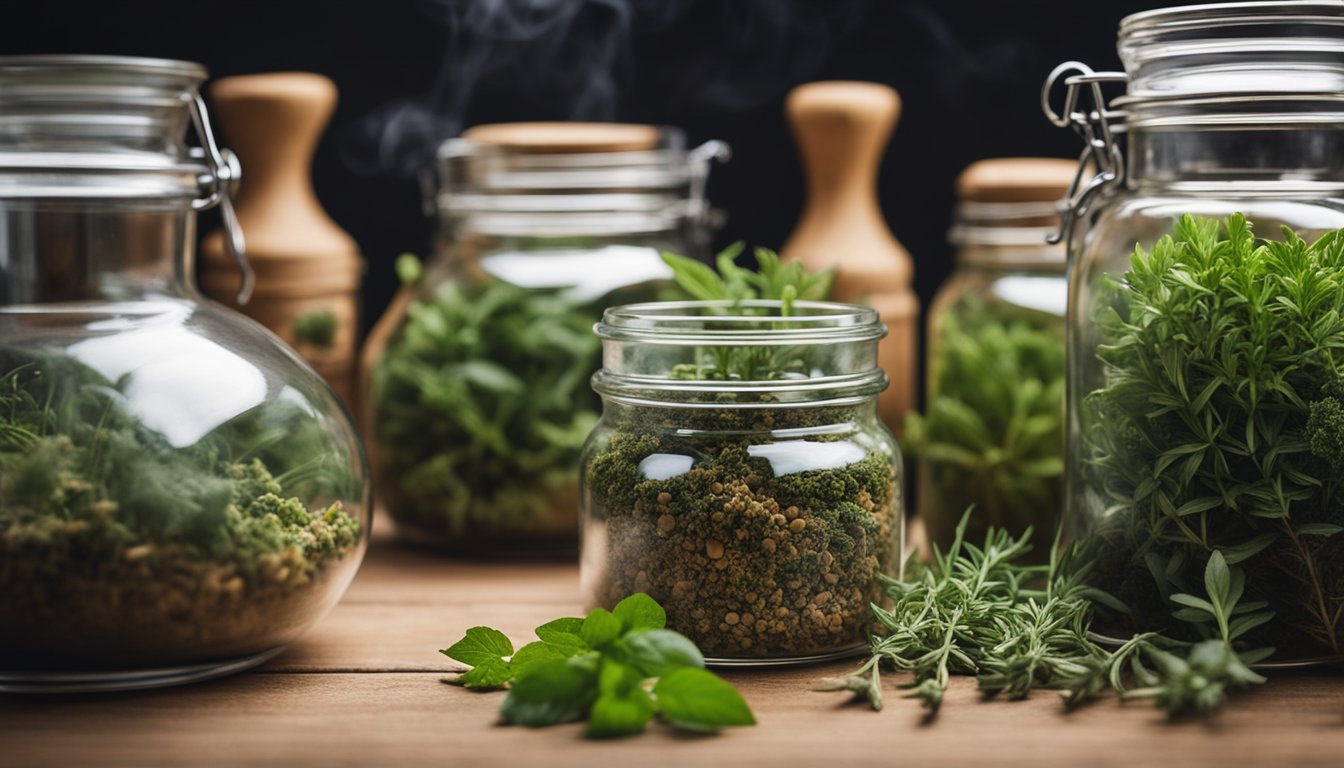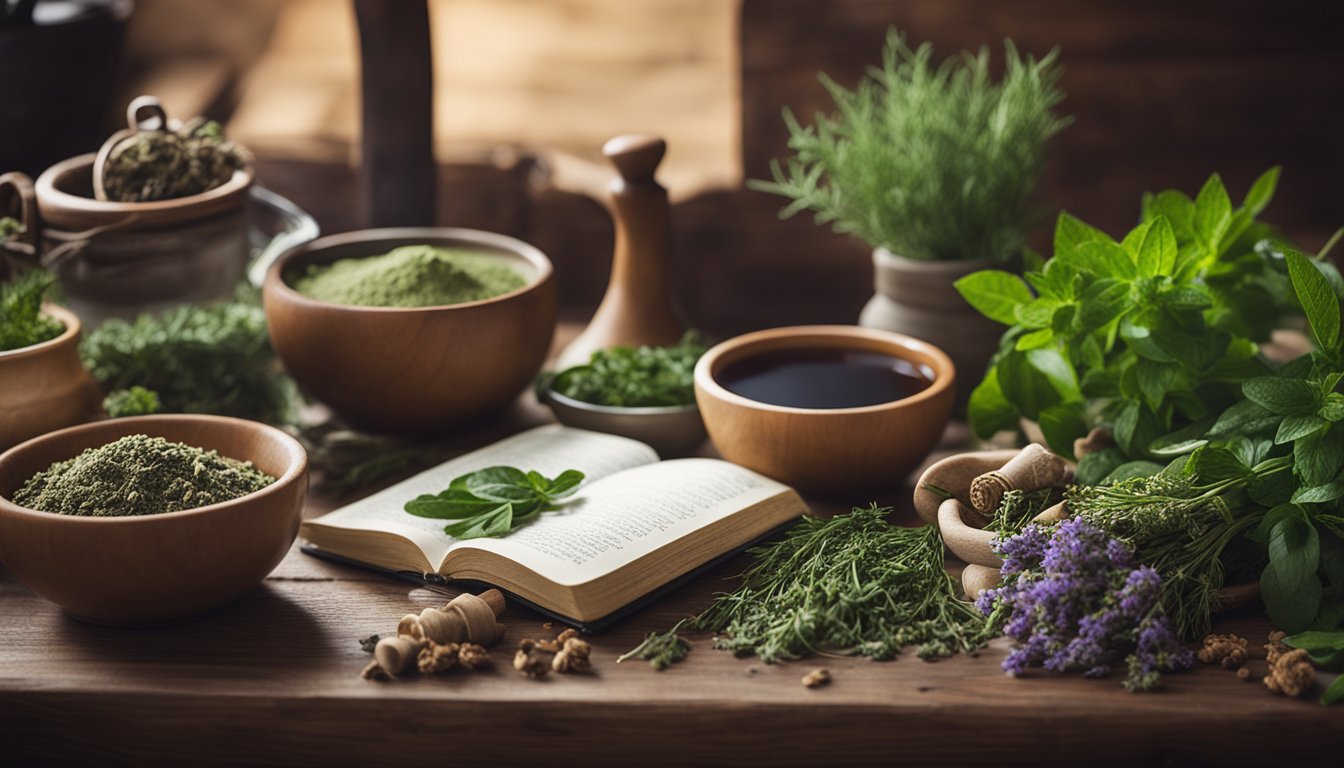If you’re interested in exploring the depths of your consciousness, lucid dreaming may be the perfect tool for you. Lucid dreaming is a state in which you become aware that you are dreaming, and can control the events of your dream. This can be an incredibly powerful experience, allowing you to explore your own mind and gain insight into your subconscious. Discover the top herbs for lucid dreaming and unlock the potential of your subconscious mind.

One way to enhance your chances of having a lucid dream is through the use of herbs. Certain herbs have been used for centuries to promote vivid and lucid dreams, and can be a great addition to your lucid dreaming practice. However, it’s important to note that not all herbs are created equal, and some can have adverse effects if not used properly.
In this article, we’ll take a closer look at herbal remedies for lucid dreaming, including their benefits, preparation and consumption methods, and safety considerations. We’ll also explore ways to enhance your dream awareness and recall, so you can make the most of your lucid dreaming practice.
Understanding Lucid Dreaming
Lucid dreaming is the ability to become conscious and aware during a dream state. It is a state where you are aware that you are dreaming, and you can control the dream’s content. This state of consciousness is not limited to any age group, and anyone can learn to lucid dream with practice.
The Science of Lucid Dreams
Lucid dreaming is a state of consciousness that occurs during Rapid Eye Movement (REM) sleep. During REM sleep, the brain is highly active, and it is the stage of sleep where we have the most vivid dreams. In a lucid dream, the brain is conscious, and the dreamer is aware of the dream state. According to research, lucid dreaming is associated with increased activity in the prefrontal cortex, the part of the brain responsible for decision-making, planning, and cognitive function.
Benefits of Lucid Dreaming
Lucid dreaming has many benefits, including improving cognitive function, enhancing creativity, and reducing anxiety. When you become aware that you are dreaming, you can control the dream’s content. This ability can help you overcome fears, phobias, and other psychological issues. Additionally, lucid dreaming can help you improve dream recall, which can help you understand your subconscious mind better.
In summary, lucid dreaming is a state of consciousness that occurs during REM sleep. It is a state where you are aware that you are dreaming, and you can control the dream’s content. Lucid dreaming has many benefits, including improving cognitive function, enhancing creativity, and reducing anxiety. With practice, anyone can learn to lucid dream and experience its many benefits.
Herbs for Lucid Dreaming

If you are looking for a natural way to enhance your dreaming experience, herbal remedies might be an option to consider. Here are a few herbs that have been traditionally used to promote lucid dreaming:
Mugwort and Dream Recall
Mugwort (Artemisia vulgaris) is a popular herb for lucid dreaming. It is believed to enhance dream recall and make dreams more vivid and meaningful. Mugwort can be consumed in various forms such as tea, smoke, or tincture. When preparing a mugwort tea, it is recommended to use one teaspoon of dried herb per cup of water and steep it for 10-15 minutes. Smoking mugwort before bed can also be an effective method to induce lucid dreams. However, it is important to note that smoking can have negative health effects and should be done in moderation.
Calea Zacatechichi and Dream Intensity
Calea Zacatechichi, also known as “the dream herb,” has been used for centuries by the Chontal Indians of Mexico to induce lucid dreams. It is believed to increase dream intensity and make dreams more vivid and memorable. Calea Zacatechichi can be consumed in various forms such as tea, smoke, or tincture. When preparing a Calea Zacatechichi tea, it is recommended to use one tablespoon of dried herb per cup of water and steep it for 10-15 minutes. It is important to note that Calea Zacatechichi can have a bitter taste, so adding honey or another sweetener can make it more palatable.
Silene Capensis and Prophetic Dreams
Silene Capensis, also known as “African dream root,” is a herb traditionally used by the Xhosa people of South Africa to induce prophetic dreams. It is believed to enhance dream recall and make dreams more vivid and meaningful. Silene Capensis can be consumed in various forms such as tea or tincture. When preparing a Silene Capensis tea, it is recommended to use one teaspoon of dried herb per cup of water and steep it for 10-15 minutes. It is important to note that Silene Capensis can have a bitter taste, so adding honey or another sweetener can make it more palatable.
In conclusion, herbal remedies can be a natural way to enhance your dreaming experience. However, it is important to do your own research and consult with a healthcare professional before consuming any herbs, especially if you are pregnant, breastfeeding, or taking medication. Additionally, it is important to follow recommended doses and not exceed them as this can lead to negative side effects.
Preparation and Consumption Methods

Lucid dreaming herbs can be consumed in various forms, such as teas, tinctures, extracts, and smoking. Each method has its own advantages and disadvantages, and it is important to choose the one that suits you best.
Teas and Infusions
Teas and infusions are the most common way to consume lucid dreaming herbs. They are easy to prepare, and the taste can be improved with honey or other sweeteners. To make a tea, simply boil water and add the herb of your choice. Let it steep for a few minutes, strain, and drink.
Sage is a popular herb for lucid dreaming teas, and it is known for its calming effects. It is recommended to drink sage tea before bed to promote relaxation and enhance dream recall.
Tinctures and Extracts
Tinctures and extracts are concentrated forms of herbs that can be added to water or other liquids. They are more potent than teas and can be easier to consume. Tinctures and extracts are also more convenient for people who don’t like the taste of herbs.
When using tinctures and extracts, it is important to follow the recommended doses. Overconsumption can lead to unwanted side effects. Blue lotus is a popular herb for tinctures and extracts, and it is known for its calming and relaxing effects.
Smoking and Inhalation
Smoking and inhalation are less common ways to consume lucid dreaming herbs. They are more potent than teas and tinctures, but they can also be harsh on the lungs. Smoking and inhalation are not recommended for people with respiratory problems.
When smoking or inhaling herbs, it is important to use a pipe or vaporizer. This will ensure that the herbs are burned at the correct temperature and that the smoke is not too harsh. Calea ternifolia is a popular herb for smoking and inhalation, and it is known for its dream-enhancing effects.
In conclusion, there are various ways to consume lucid dreaming herbs, and each method has its own advantages and disadvantages. Whether you prefer teas, tinctures, or smoking, it is important to choose the method that suits you best and to follow the recommended doses.
Can Herbs for Lucid Dreaming Enhance the Effectiveness of Quick Lucid Dream Induction Techniques?
Using herbs for lucid dreaming can enhance the effectiveness of quick lucid dream induction techniques. By incorporating natural remedies, individuals can master lucid dream induction and achieve a heightened state of awareness during their dreams. Various herbs such as valerian root and mugwort are known for their ability to promote lucid dreaming.
Enhancing Dream Awareness and Recall

If you’re looking to experience lucid dreams, enhancing dream recall and awareness is a crucial first step. Here are some techniques and supplements that can help you achieve this goal.
Dream Journals and Techniques
One of the most effective ways to improve dream recall is to keep a dream journal. By writing down your dreams as soon as you wake up, you can train your brain to remember more details over time. Make sure to record everything you can remember, including emotions, colors, and sounds.
Another technique you can use is reality testing. Throughout the day, ask yourself if you’re dreaming. By getting into the habit of questioning your reality, you’ll be more likely to do so in your dreams as well. This can lead to greater awareness and control.
Supplements and Complementary Herbs
Certain supplements and herbs can also help improve dream recall and awareness. For example, vitamin B6 has been shown to enhance dream vividness and clarity. You can find this vitamin in foods like bananas, avocados, and chicken.
Other supplements that may be helpful include melatonin and valerian root. Melatonin is a hormone that regulates sleep and wakefulness, and taking it before bed can increase dream recall. Valerian root is a natural sedative that can help you fall asleep faster and improve sleep quality, leading to more vivid dreams.
Finally, there are several herbs that can complement your lucid dreaming practice. For example, mugwort has been used for centuries to enhance dream recall and awareness. You can drink it as a tea or burn it as incense before bed. Another herb to consider is chamomile, which can help promote relaxation and mental clarity.
By incorporating these techniques and supplements into your routine, you can improve your dream recall and awareness, leading to more frequent and vivid lucid dreams.
Safety and Considerations

When it comes to using herbs for lucid dreaming, it is important to keep in mind some safety considerations. While herbs can be a natural and effective way to enhance your dream experience, they can also have potential side effects and interact with other medications you may be taking. In this section, we will discuss some important safety considerations to keep in mind when using herbs for lucid dreaming.
Consulting Healthcare Providers
Before you start using any herbs for lucid dreaming, it is important to consult with your healthcare provider. They can help you determine if using herbs is safe for you, especially if you have any underlying medical conditions or are taking any medications. Your healthcare provider can also help you determine the appropriate dosage and frequency of use for the herbs you are interested in trying.
Potential Side Effects
While herbs can be a natural and effective way to enhance your dream experience, they can also have potential side effects. Some of the potential side effects of using herbs for lucid dreaming include headaches, nausea, and vomiting. In addition, some herbs may interact with other medications you may be taking, so it is important to consult with your healthcare provider before using any herbs for lucid dreaming.
It is also important to keep in mind that some herbs may have a negative impact on your mental health, especially if you have a history of anxiety or depression. If you experience any negative side effects or changes in your mental health while using herbs for lucid dreaming, it is important to stop using them and consult with your healthcare provider.
In summary, while herbs can be a natural and effective way to enhance your dream experience, it is important to keep in mind some safety considerations. Consulting with your healthcare provider and being aware of potential side effects can help you use herbs safely and effectively for lucid dreaming.

